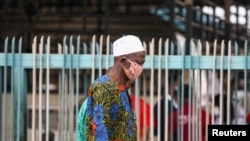As many businesses reopen across Nigeria, workers are adjusting to the new reality created by the COVID-19 pandemic, including shorter work hours, pay cuts, and higher unemployment. Nigerian authorities expect the jobless rate this year to hit one in three people.
Emmanuel Noble, 27, searched his phone, hoping for a response from one of the many places he has recently approached for a job.
He says it's not been easy for him since he was laid off from his bartending job at an Abuja night club in March following Nigeria's coronavirus lockdown.
"You can imagine in a situation where you stay and you don't have any source of income, it is very difficult to bear. We've been at home all through, nowhere to go, just sleep, wake up, walk around, nothing to do, no engagement,” Noble said.
Nigerian authorities last week began easing a nationwide lockdown but maintained restrictions on schools, religious bodies and businesses like night clubs, bars, and gardens where crowds usually gather.
Millions of Nigerians such as Emmanuel whose livelihoods depend on these businesses and institutions are having a hard time meeting their basic needs.
"It even got to the extent that I wasn't able to get recharge cards to load in my phone. I can't make contact, it's just like most movies we watch you see most people hopeless in the movie,” Noble said.
Nigeria has been battling high unemployment for many years. However, job losses triggered by the coronavirus pandemic is something new.
Nigeria's labor officials predict the unemployment rate may hit 33 percent by the end of this year.
The country director of the International Labor Organization, Dennis Zulu, says the coronavirus pandemic took a bad situation and made it even worse.
"Over the past few years we've been seeing an increase in the number of Nigerians who are unemployed and also because of new and young Nigerians entering the labor market who are not able to find jobs, this has further exacerbated the situation. So now coupled with the COVID-19 pandemic, the situation is of very serious concern and it could get worse depending on how this pandemic evolves,” Zulu said.
Businesses are reopening across Nigeria but they are applying measures like shorter operating hours and pay cuts in order to survive in this age of the coronavirus.
Zulu said it could take them a while to stabilize.
"We should not be oblivious to the fact that some of them are still struggling now because the weeks of shutdown really affected their ability to generate working capital which they need for their own business operations," Zulu said.
The International Monetary Fund, IMF, says Nigeria's oil dependent economy will shrink by more than three percent this year because of falling global oil prices triggered by the coronavirus lockdowns.
That is not good news for Emmanuel Noble. He plans to keep looking for work.
But unless something dramatic happens, his job search may go on for months to come.
Nigeria's Jobless Pessimistic About Finding Work as Businesses Reopen After COVID Lockdown




